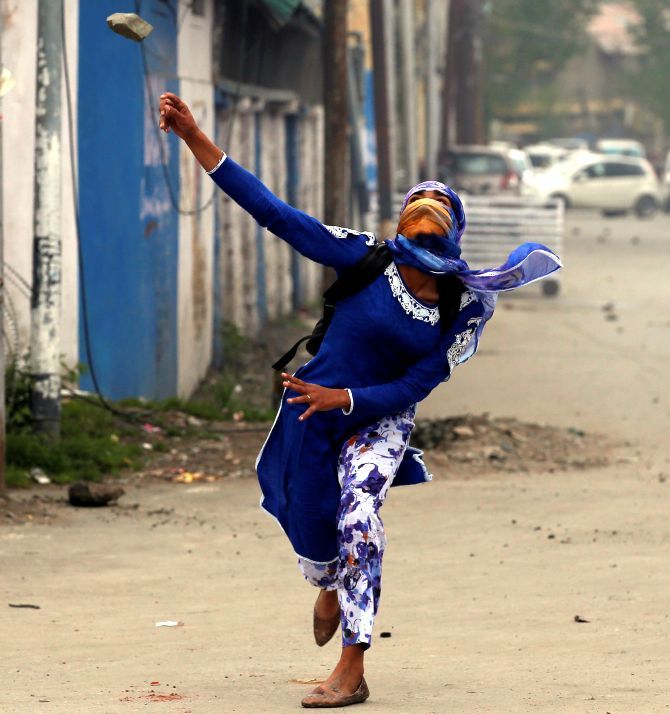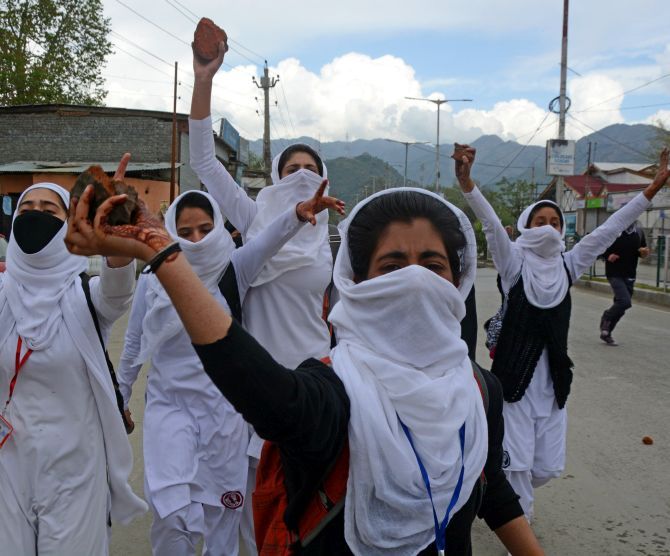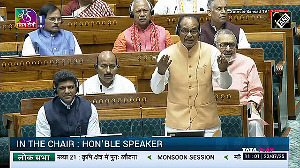Girls in the Kashmir valley hurling defiance at the security forces will detract from the legitimacy of India's response and its standing in the world, observes Ajai Shukla.

For years now, India has faced almost negligible pressure from the international community to resolve the Kashmir issue.
Most other countries, even China, have largely respected India's position that Kashmir is a bilateral issue with Pakistan. Only New Delhi and Islamabad pay much attention to their annual United Nations General Assembly tit for tat in New York, where Pakistan launches broadsides at India over Kashmir, provoking New Delhi into responding.
But that counts for little, given Pakistan's standing as the epicentre of global jihad and its reputation for using extremist groups as instruments of State policy.
Besides this, there is only occasional back-channel pressure from Washington encouraging New Delhi to de-escalate when confrontation with Pakistan crosses a certain threshold.
Worryingly, this might be changing since last July, when the Kashmiri street erupted in violent protest after the security forces gunned down Hizbul Mujahideen terrorist and Kashmiri social media icon Burhan Wani.
In November, United States President-elect Donald Trump, who fancies himself a deal-maker, offered to mediate on Kashmir between India and Pakistan.
While New Delhi brushed that off as naivety from an inexperienced leader, Washington reiterated its unsolicited offer last month when America's envoy to the UN and influential foreign policy mouthpiece, Nikki Haley, announced that President Trump himself might join an India-Pakistan peace process.
This time, New Delhi had to publicly reject the offer.
Now, with New Delhi unable to douse the anger in the Kashmir valley, more unwelcome offers are coming in.
On the eve of his visit to New Delhi, Turkey's President Recep Tayyip Erdogan told an Indian television channel that 'multilateral dialogue' was needed to 'settle this question once and for all,' for which he offered Ankara's involvement.
The offer apparently stems from the conviction that India is in trouble in Kashmir.
This trend towards internationalisation of the Kashmir issue is exactly what Pakistan wants, having for decades been trying to bypass the 1972 Shimla Agreement stipulation that India and Pakistan must solve Kashmir bilaterally.
When the Indian Army foiled General Pervez Musharraf's plan to push Pakistani soldiers across the Line of Control near Kargil to capture Indian territory, he tried to justify the debacle by claiming it had successfully internationalised Kashmir.
That cut little ice when all the headlines were about Indian success and strategic restraint.
This time, the headlines are lambasting India: The Washington Post: 'Teen girls with stones are the new threat in India's Kashmir conflict'; The New York Times: 'Cruelty and cowardice in Kashmir'; Los Angeles Times: 'India swiftly rejects UN request for a visit to the disputed territory of Kashmir'.
While these are the views of a liberal news media, they influence the agenda for American lawmakers in Congress.
REDIFF RECOMMENDS:
- The Hindu seer who wants to take on Kashmiri stone-pelters
- Why civilians confront the army in Kashmir
- What we need to do in Kashmir. Now!
Last August, soon after Kashmir went up in flames, a provocative opinion piece in the Hindustan Times, co-authored by Ashok Malik and Samir Saran, argued that international opinion on Kashmir would inevitably side with India since 'international appetite for experiments with self-determination is at its lowest since World War I' and 'the desire of the global community for a quasi-independent or unshackled Kashmir... is near zero'.
Arguing that the Kashmiri aspiration for azaadi (freedom) was Islamist rather than nationalist, the article outrageously stated: 'Cruel as this sounds, images of stone-pelting protesters being tear-gassed and shot today evoke less horror in the rest of India and the planet than do visuals of masked young men, dressed in black, carrying AK-47s and promoting a mix of religion and armed rebellion. In a post-9/11, post-Islamic State world, the proposition that Islamists are fighting for freedom is neither sellable nor credible.'
Rising international concern over Kashmir has discredited this argument, which boils down to: We can keep killing and maiming Kashmiris, since Islamophobia will temper any criticism. While even crusading non-governmental organisations such as Human Rights Watch and Amnesty International might cut India some slack in security forces operations against armed jihadi groups such as the Lashkar-e-Tayiba and the Hizbul Mujahideen, the killing and maiming of civilian protesters will evoke only horror and outrage.
When a staunch Western ally such as Israel draws savage criticism for using disproportionate force against Palestinian civilians -- even the stone-pelters of the two intifadas -- why would New Delhi expect to be judged by a lesser standard?

Yet, the pivotal question should not be whether India could plausibly justify using violent, even lethal, force against rampaging civilian mobs.
Instead, the question should be whether India -- as a humane, liberal democracy that goes by the rule of law -- wants to do so.
This confrontation is avoidable. As numerous commentators such as former Kashmir interlocutor Radha Kumar; experienced Bharatiya Janata Party elder Yashwant Sinha and the previous army commander in Jammu-Kashmir Lieutenant General D S Hooda, have pointed out, the Kashmiri street can be quietened by initiating a dialogue process with multiple stakeholders in the valley, including the separatists.
This would end the bloodletting, at least for now.
However, Prime Minister Narendra Modi's political instincts are to make no concessions, instead tossing Kashmir a trite choice between tourism and terrorism, and directing Attorney General Mukul Rohatgi to tell the Supreme Court that the government will not talk to separatists.
This invites continuing bloodshed, weakening our international position further.
Ironically, while Kashmir goes ignored, last month saw Mr Modi's confidant steel tycoon Sajjan Jindal travelling to Pakistan for a hastily arranged meeting with Prime Minister Nawaz Sharif.
Speculation centres on the resumption of dialogue, which could be the reason why the Pakistan army killed two Indian soldiers and mutilated their bodies.
New Delhi has remained silent on Jindal's visit, but it would be infinitely preferable to sequence talks with Kashmiri groups before initiating dialogue with Pakistan.
After pacifying the valley to some extent, New Delhi would not have to talk to Islamabad from a position of weakness.
Human rights bodies have a record of criticising Indian security forces (sometimes undeservedly) for heavy-handedness in Kashmir, and for the continuing imposition of the Armed Forces (Special Powers) Act.
However, recent images from Kashmir, like disturbing footage of young girls in school and college uniforms hurling defiance at armed Indian security men, will inevitably detract from the legitimacy of India's response and our standing in the international community.
MORE KASHMIR-RELATED FEATURES IN THE RELATED LINKS BELOW...












